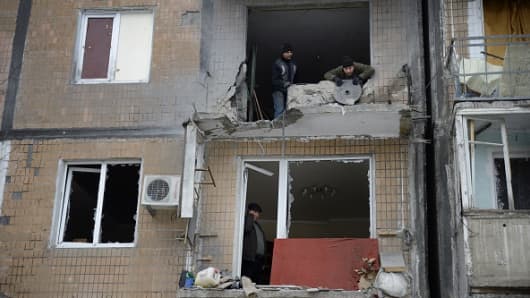Ukraine's bonds have had a terrible year as the country's
conflict with Russia wears on, but could be a canny buy in 2015, some
experts say.
"Ukraine looks relatively attractive, even the longer-dated bonds… We expect the official sector to continue to support Ukraine in the near-term," said Stuart Culverhouse and Jakob Christensen, economists at Exotix Fixed Research, in a report on Tuesday.
Ukraine has been teetering on the edge of default following the overthrow of its president earlier this year, the secession of Crimea and subsequent civil war involving Russian-backed rebels. The price of its sovereign bonds have declined around 18 percent this year in the JPMorgan Emerging Markets Bond Global Diversified Index, making Ukraine the worst performer bar Venezuela, according to Exotix.
"Ukraine looks relatively attractive, even the longer-dated bonds… We expect the official sector to continue to support Ukraine in the near-term," said Stuart Culverhouse and Jakob Christensen, economists at Exotix Fixed Research, in a report on Tuesday.
Ukraine has been teetering on the edge of default following the overthrow of its president earlier this year, the secession of Crimea and subsequent civil war involving Russian-backed rebels. The price of its sovereign bonds have declined around 18 percent this year in the JPMorgan Emerging Markets Bond Global Diversified Index, making Ukraine the worst performer bar Venezuela, according to Exotix.
Ukraine has signed a $17 billion loan deal with the International Monetary Fund (IMF), but could need another $15 billion to stay afloat, with a bond repayment looming in March.
Culverhouse and Christensen said the prospect of further aid
for Ukraine made its debt looked attractive compared to high-yielding alternatives like Venezuela and Argentina—the latter of which suffered a partial default this year.
"There are good geo-political arguments as to why the official sector may stump up the additional financing," the economists wrote.
Ukraine's economy is seen shrinking 5 percent this year. Its currency has tumbled over 90 percent against the U.S. dollar, as inflation spirals and the country faces a cold winter without cheap gas supplies from Russia.
Read MoreRuble stabilizes but experts expect more pain
IMF representatives are due to return to Kiev for talks next month. Further aid will be conditional on the country progressing with both political and economic reforms.
Earlier this month, a leading Ukrainian official told CNBC the risk of a default was "minimal". Dmytro Shymkiv, deputy head of presidential administration, argued that 95 percent of the country was unaffected by the military conflict in east Ukraine, and hinted at the prospect of forthcoming IMF financial assistance.
Read MoreWill the IMF bring Ukraine in from the cold?
"We do have economic difficulties, but that is something that is going into the debate with the IMF," Shymkiv told CNBC on December 12.
However, Moody's Investors Service warned on Tuesday that the risk of a default was rising, with new credit from the IMF, the European Union and other official lenders likely to prove insufficient to cover debts.
Also on Tuesday, Ukraine's parliament voted to work towards NATO membership on Tuesday, in a move that would bind the country closer to the international community. Russia has previously opposed Ukrainian membership of the international military alliance, and described Tuesday's step as "unfriendly".
Read MoreUkrainian parliament votes to ax 'nonaligned' status
Culverhouse and Christensen said the prospect of further aid
for Ukraine made its debt looked attractive compared to high-yielding alternatives like Venezuela and Argentina—the latter of which suffered a partial default this year.
"There are good geo-political arguments as to why the official sector may stump up the additional financing," the economists wrote.
Ukraine's economy is seen shrinking 5 percent this year. Its currency has tumbled over 90 percent against the U.S. dollar, as inflation spirals and the country faces a cold winter without cheap gas supplies from Russia.
Read MoreRuble stabilizes but experts expect more pain
IMF representatives are due to return to Kiev for talks next month. Further aid will be conditional on the country progressing with both political and economic reforms.
Earlier this month, a leading Ukrainian official told CNBC the risk of a default was "minimal". Dmytro Shymkiv, deputy head of presidential administration, argued that 95 percent of the country was unaffected by the military conflict in east Ukraine, and hinted at the prospect of forthcoming IMF financial assistance.
Read MoreWill the IMF bring Ukraine in from the cold?
"We do have economic difficulties, but that is something that is going into the debate with the IMF," Shymkiv told CNBC on December 12.
However, Moody's Investors Service warned on Tuesday that the risk of a default was rising, with new credit from the IMF, the European Union and other official lenders likely to prove insufficient to cover debts.
Also on Tuesday, Ukraine's parliament voted to work towards NATO membership on Tuesday, in a move that would bind the country closer to the international community. Russia has previously opposed Ukrainian membership of the international military alliance, and described Tuesday's step as "unfriendly".
Read MoreUkrainian parliament votes to ax 'nonaligned' status

Katy BarnatoAssociate Producer, CNBC.com


No comments:
Post a Comment